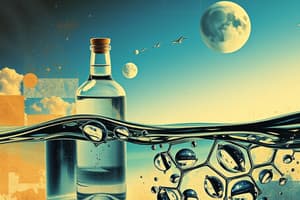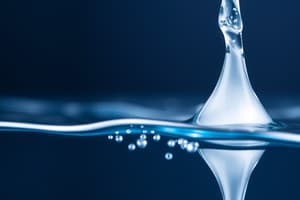Podcast
Questions and Answers
What type of substances do water molecules attract due to their polarity?
What type of substances do water molecules attract due to their polarity?
- Hydrophilic substances (correct)
- Ionic compounds
- Non-polar molecules
- Hydrophobic substances
Which of the following best describes substances repelled by water molecules?
Which of the following best describes substances repelled by water molecules?
- Water-loving substances
- Soluble substances
- Polar molecules
- Hydrophobic substances (correct)
Given the interaction of water and oil, what is the likely behavior of oil in water?
Given the interaction of water and oil, what is the likely behavior of oil in water?
- It sinks to the bottom
- It forms bubbles and floats on the surface (correct)
- It dissolves evenly throughout the water
- It mixes completely with the water
How does the polarity of water molecules influence their interaction with other molecules?
How does the polarity of water molecules influence their interaction with other molecules?
What is the primary reason why oil forms bubbles in water?
What is the primary reason why oil forms bubbles in water?
What defines a solvent in a solution?
What defines a solvent in a solution?
Which type of molecules does water act as a universal solvent for?
Which type of molecules does water act as a universal solvent for?
Which of the following substances is likely to dissolve well in water?
Which of the following substances is likely to dissolve well in water?
What characterizes water as a 'fine solvent'?
What characterizes water as a 'fine solvent'?
In the context of the properties of water, which statement is incorrect?
In the context of the properties of water, which statement is incorrect?
What property of water contributes to its ability to dissolve many substances?
What property of water contributes to its ability to dissolve many substances?
Which property of water allows it to absorb and release large amounts of heat without significant temperature change?
Which property of water allows it to absorb and release large amounts of heat without significant temperature change?
What does the maximum density of water occurring at 4°C imply for aquatic life?
What does the maximum density of water occurring at 4°C imply for aquatic life?
Which property of water is primarily responsible for water molecules sticking together?
Which property of water is primarily responsible for water molecules sticking together?
How does the high latent heat of vaporization of water benefit the environment?
How does the high latent heat of vaporization of water benefit the environment?
What role does water play in biological chemical reactions?
What role does water play in biological chemical reactions?
How is water significant in the composition of blood?
How is water significant in the composition of blood?
Which of the following statements about water as a universal solvent is true?
Which of the following statements about water as a universal solvent is true?
What percentage of plasma is made up of water?
What percentage of plasma is made up of water?
Which component of blood is primarily responsible for maintaining osmotic pressure and transporting hormones?
Which component of blood is primarily responsible for maintaining osmotic pressure and transporting hormones?
What is the specific heat capacity of water in terms of the heat required to change its temperature?
What is the specific heat capacity of water in terms of the heat required to change its temperature?
What does it imply if water has a high specific heat capacity?
What does it imply if water has a high specific heat capacity?
Which of the following statements accurately reflects the behavior of water's temperature in relation to heat absorption?
Which of the following statements accurately reflects the behavior of water's temperature in relation to heat absorption?
How does the specific heat capacity of water compare to that of most other substances?
How does the specific heat capacity of water compare to that of most other substances?
Why is the specific heat capacity of water significant in environmental contexts?
Why is the specific heat capacity of water significant in environmental contexts?
What is defined as the quantity of heat required to convert 1 g of water from liquid to gas?
What is defined as the quantity of heat required to convert 1 g of water from liquid to gas?
Why is a large amount of heat energy necessary for water to vaporize?
Why is a large amount of heat energy necessary for water to vaporize?
What phenomenon accompanies the absorption of heat energy by water molecules during vaporization?
What phenomenon accompanies the absorption of heat energy by water molecules during vaporization?
In the diagram, what do the red arrows indicate?
In the diagram, what do the red arrows indicate?
What process is demonstrated by the purple arrows in the diagram?
What process is demonstrated by the purple arrows in the diagram?
What is the significance of water's high specific heat capacity in cellular environments?
What is the significance of water's high specific heat capacity in cellular environments?
How does the high specific heat capacity of water benefit marine life?
How does the high specific heat capacity of water benefit marine life?
What would be a direct consequence of water not having a high specific heat capacity?
What would be a direct consequence of water not having a high specific heat capacity?
Which property of water primarily allows it to act as a temperature buffer for living organisms?
Which property of water primarily allows it to act as a temperature buffer for living organisms?
In what way does water's high specific heat capacity impact climate regulation?
In what way does water's high specific heat capacity impact climate regulation?
What term is used to describe the attraction between water molecules?
What term is used to describe the attraction between water molecules?
What causes water molecules to be attracted to other polar molecules?
What causes water molecules to be attracted to other polar molecules?
Which statement correctly describes the difference between cohesion and adhesion in water?
Which statement correctly describes the difference between cohesion and adhesion in water?
Which of the following best describes hydrogen bonds in water?
Which of the following best describes hydrogen bonds in water?
What is the effect of cohesion on the behavior of water in nature?
What is the effect of cohesion on the behavior of water in nature?
What is responsible for water's high surface tension?
What is responsible for water's high surface tension?
How does the surface tension of water compare to other liquids?
How does the surface tension of water compare to other liquids?
What happens to the attraction among water molecules within a body of water?
What happens to the attraction among water molecules within a body of water?
Why is surface tension vital for water behavior in nature?
Why is surface tension vital for water behavior in nature?
Which statement accurately reflects the properties of water molecules?
Which statement accurately reflects the properties of water molecules?
What is primarily responsible for the high surface tension observed at the surface of water?
What is primarily responsible for the high surface tension observed at the surface of water?
How do water molecules behave at the air-water interface?
How do water molecules behave at the air-water interface?
What visual representation would depict the cohesive forces acting on water molecules within a drop?
What visual representation would depict the cohesive forces acting on water molecules within a drop?
What contributes to the surface tension of ponds, as illustrated in the cohesive property of water?
What contributes to the surface tension of ponds, as illustrated in the cohesive property of water?
What effect does the unequal attraction of water molecules have at the surface?
What effect does the unequal attraction of water molecules have at the surface?
Flashcards are hidden until you start studying
Study Notes
Water Properties and Importance
- Water is a polar molecule, attracted to other polar molecules (hydrophilic).
- Water is repelled by non-polar molecules (hydrophobic).
- Water is a universal solvent for polar molecules and ions because it can dissolve polar molecules and ions.
- Water is a fine solvent for dissolving polar molecules and ions.
- Water has a high specific heat capacity, meaning a large amount of heat is needed to change its temperature.
- Water's high specific heat capacity helps maintain relatively constant temperatures:
- In cells, acting as a temperature buffer.
- In oceans, creating favorable environments for marine life.
- Water has a high latent heat of vaporization which is the heat required to change 1g of water from liquid to gas.
- Water’s high latent heat of vaporization is due to the energy required to break the hydrogen bonds between water molecules.
- Water molecules are cohesive, meaning they attract each other due to hydrogen bonding.
- Cohesion and adhesion are responsible for water's surface tension, which is higher than most other liquids.
- Cohesive forces are uneven at the air-water interface because molecules at the surface experience less attraction than those inside the water, which leads to higher surface tension.
- Cohesive forces also contribute to the formation of water drops.
Blood Composition
- Blood is composed of approximately 55% plasma, which is mostly water, proteins, electrolytes, and dissolved gases like oxygen (O₂) and carbon dioxide (CO₂).
Studying That Suits You
Use AI to generate personalized quizzes and flashcards to suit your learning preferences.




